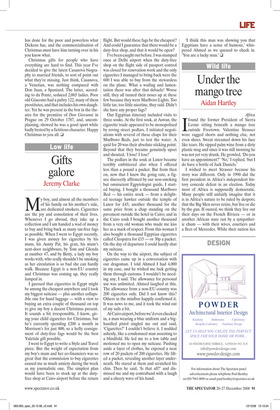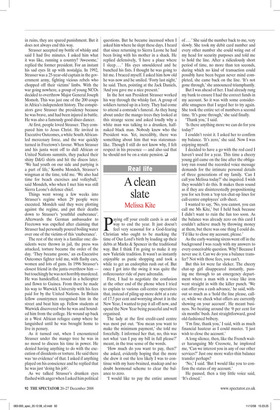Under the mango tree
Aidan Hartley
Africa Ifound the former President of Sierra Leone sitting beneath a mango tree outside Freetown. Valentine Strasser wore ragged shorts and nothing else, not even shoes. Sweat streamed down his face like tears. He sipped palm wine from a dirty plastic mug and since it was still morning he was not yet very drunk. He growled, ‘Do you have an appointment?’ ‘No,’ I replied, ‘but I do have a bottle of Jack Daniels.’ I wished to meet Strasser because his story was different. Only in 1990 did the first president in Africa’s independent history concede defeat in an election. Today most of Africa is supposedly democratic. Many people still unfairly imagine that it is in Africa’s nature to be ruled by despots; that the Big Men never retire, but live or die by the gun. If ousted, we think they live out their days on the French Riviera — or in another African state run by a sympathetic chum — with their wives, courtiers and a fleet of Mercedes. While their nation lies in ruins, they are spared punishment. But it does not always end this way.
Strasser accepted my bottle of whisky and said I had five minutes. I asked him what it was like, running a country? ‘Awesome,’ replied the former president. For an instant his sad eyes lit up with nostalgia. In 1992, Strasser was a 25-year-old captain in the government army, fighting vicious rebels who chopped off their victims’ limbs. With the war going nowhere, a group of young NCOs decided to overthrow Major General Joseph Momoh. This was just one of the 200 coups in Africa’s independent history. The conspirators gave Strasser the presidency because he was brave, and had been injured in battle. He was also a famously good disco dancer.
At first, people loved Strasser. They compared him to Jesus Christ. He invited in Executive Outcomes, a white South Africanled mercenary force, and the war quickly turned in Freetown’s favour. When Strasser and his junta went off to dull African or United Nations summits, they packed their shiny D&G shirts and hit the discos later. ‘We had youth on our side and partying is a part of life,’ Komba Mondeh, Strasser’s wingman at the time, told me. ‘We also had time for beach exercises and volleyball,’ said Mondeh, who when I met him was still Sierra Leone’s defence chief.
Things went wrong a few weeks into Strasser’s regime when 29 people were executed. Mondeh said they were plotting against the regime, and put their deaths down to Strasser’s ‘youthful exuberance’. Afterwards the German ambassador to Freetown was expelled after claiming that Strasser had personally poured boiling water over one of the victims of this ‘exuberance’.
The rest of the story is a familiar one: dissidents were thrown in jail, the press was attacked, torture became the order of the day. ‘They became goons,’ an ex-Executive Outcomes fighter told me, with flashy cars, women and lots of guns. In 1996 Strasser’s closest friend in the junta overthrew him — but touchingly he was not horribly murdered. He was handcuffed, tossed in a helicopter and flown to Guinea. From there he made his way to Warwick University with his fees paid for by the United Nations. In Britain fellow countrymen recognised him in the street and beat him up. Fellow students at Warwick discovered who he was and hounded him from the college. He wound up back in a West African refugee camp where he languished until he was brought home to live in penury.
As it turned out, when I encountered Strasser under the mango tree he was in no mood to discuss his time in power. He denied having anything to do with the execution of dissidents or torture. He said there was ‘no evidence’ of that. I asked if anything played on his conscience and he replied that he was just ‘doing his job’.
As we talked Strasser’s drunken eyes flashed with anger when I asked him political questions. But he became incensed when I asked him where he slept these days. I heard that since returning to Sierra Leone he had been living with his mother in a shack. He replied defensively, ‘I have a place where I sleep ... ’ His eyes smouldered and he bunched his fists. I thought he was going to hit me. I braced myself. I asked him how old he was now and he smiled. ‘Forty last night,’ he said. Then, pointing at the Jack Daniels, ‘And you gave me a nice present.’ In the hot sun President Strasser worked his way through the whisky fast. A group of soldiers turned up in a lorry. They had come to attend a comrade’s funeral. As they hung about under the mango trees they looked at this strange scene and asked loudly why a white man was talking to a drunken, halfnaked black man. Nobody knew who the President was. Yet, incredibly, there was something about him that was statesmanlike. Though I still do not know why, I felt respect in his presence — and also sad that he should not be on a state pension. ❑























































































































 Previous page
Previous page